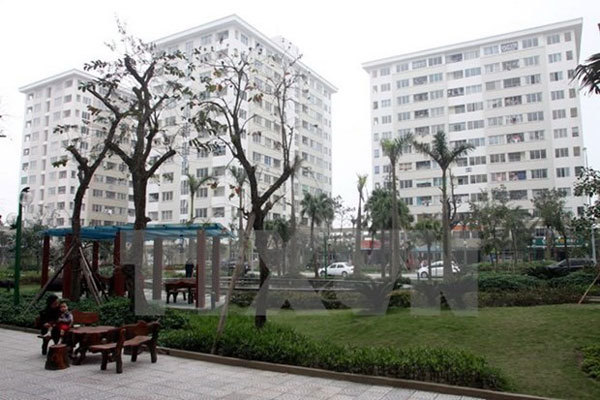Local authorities told to report on land available for social housing projects
70% of Vietnam’s low-cost houses built in Hanoi
 |
| A social housing project in HCM City. The PM has asked the Ministry of Construction to review the use and planning of urban land available for social housing nationwide. VNA/VNS Photo Tuan Anh |
The Ministry of Construction has asked the People’s Committees of provinces and cities nationwide to compile data on available land that could be used for social housing, and the percentage of land set aside for social housing in commercial housing projects.
The Law on Housing as well as Government Decree 100, which took effect in 2015, requires investors in commercial housing and new urban projects of 10 ha or more to set aside 20 per cent of their land in each project for social housing.
The reports from each province and city must include the number of social housing projects and units, land-use scale, and the status of planned or ongoing social housing projects.
The social-housing land fund, which sets aside land plots for such projects, consists of State-managed lands, most of which are now fully occupied.
Under the Government’s social housing programme to 2020, the country needs 12.5 million square metres of housing for low-income people living in urban areas and workers in industrial parks.
However, only 30 per cent of the target nationwide has been met. The Ministry of Construction blamed the delay on the failure of provinces and cities to allocate land for social housing.
According to the ministry, the country needs more than 440,000 social apartments in the 2011-2020 period.
Of the number, HCM City needs about 134,000 social apartments, Hanoi 110,000; Binh Duong 41,250; Dong Nai 36,700; and Da Nang 11,500.
Housing in HCM City
HCM City has recently invested in 41 social housing projects with a total land area of 137.3 hectares and 44,900 apartments.
The city’s Department of Construction said that an additional 20,000 social units could be built in the next two years.
To achieve the targets for the 2016-2020 period approved by the city People’s Committee, the department has proposed developing 2.6 million square metres of social housing by the end of the year.
The department said it would work with agencies to offer incentives to attract investors to social housing projects.
Le Hoang Chau, chairman of the HCM City Real Estate Association, said the social housing land fund must be “managed and used effectively”.
The association said the city should involve real estate businesses in the effort to serve the growing but largely unmet demands from middle- and low-income people.
Nguyen Tran Nam, chairman of the Viet Nam Real Estate Association, said that major cities such as Hanoi, HCM City and Da Nang had failed to comply with the laws of the Government on social housing development.
Most localities have not approved planning for social housing projects, or owners of commercial projects have failed to comply with their obligations, he said.
Housing demand is huge in Vietnam’s major cities, particularly among the poor and low-income families.
The Government has adopted many policies to help people buy houses at a low cost, but the demand has not been met, experts said.
VNS
 To address the shortage of low-income housing, Prime Minister Nguyen Xuan Phuc has told the Ministry of Construction to review the use and planning of urban land available for social housing nationwide and submit the results to him by September.
To address the shortage of low-income housing, Prime Minister Nguyen Xuan Phuc has told the Ministry of Construction to review the use and planning of urban land available for social housing nationwide and submit the results to him by September.